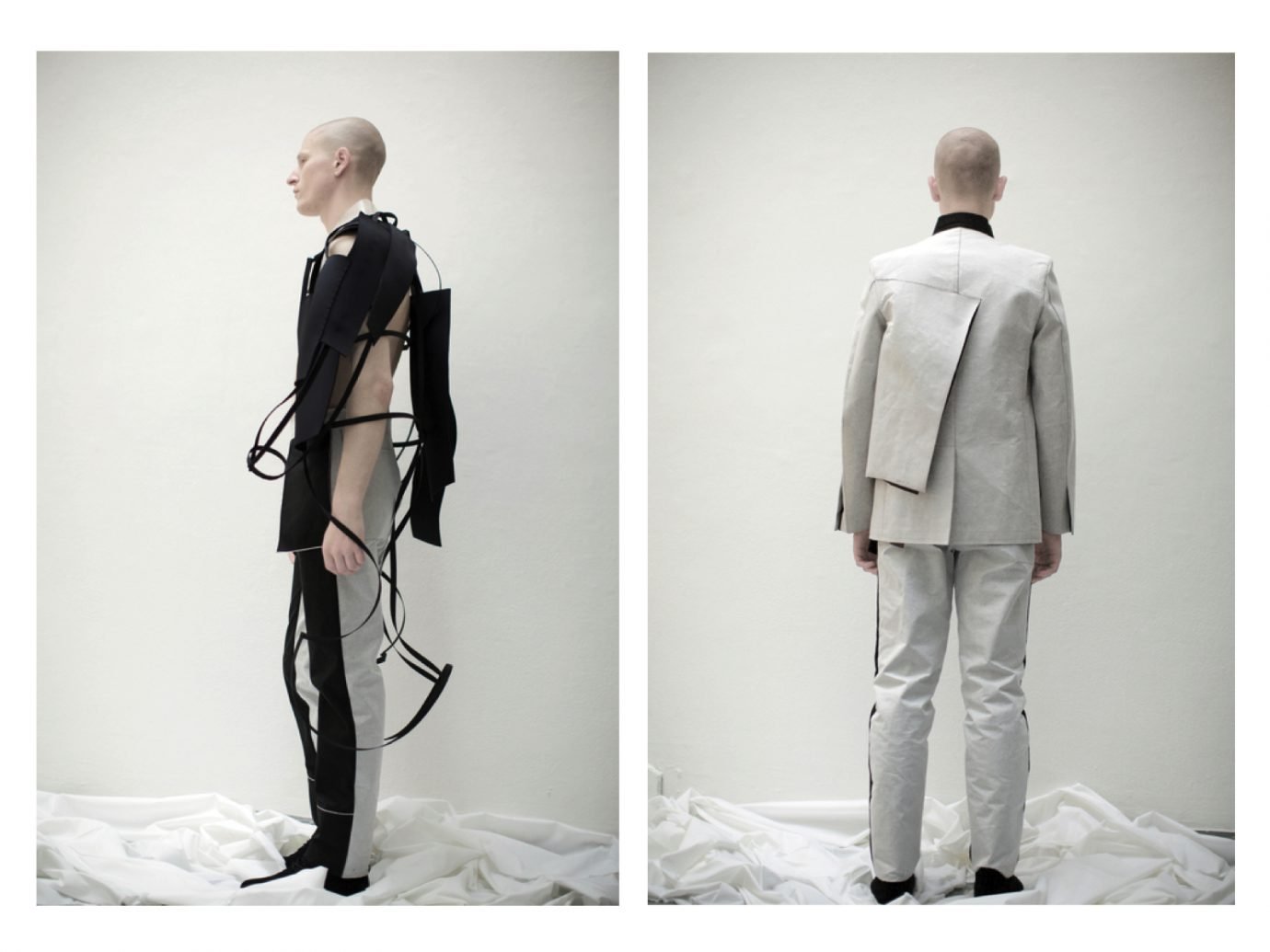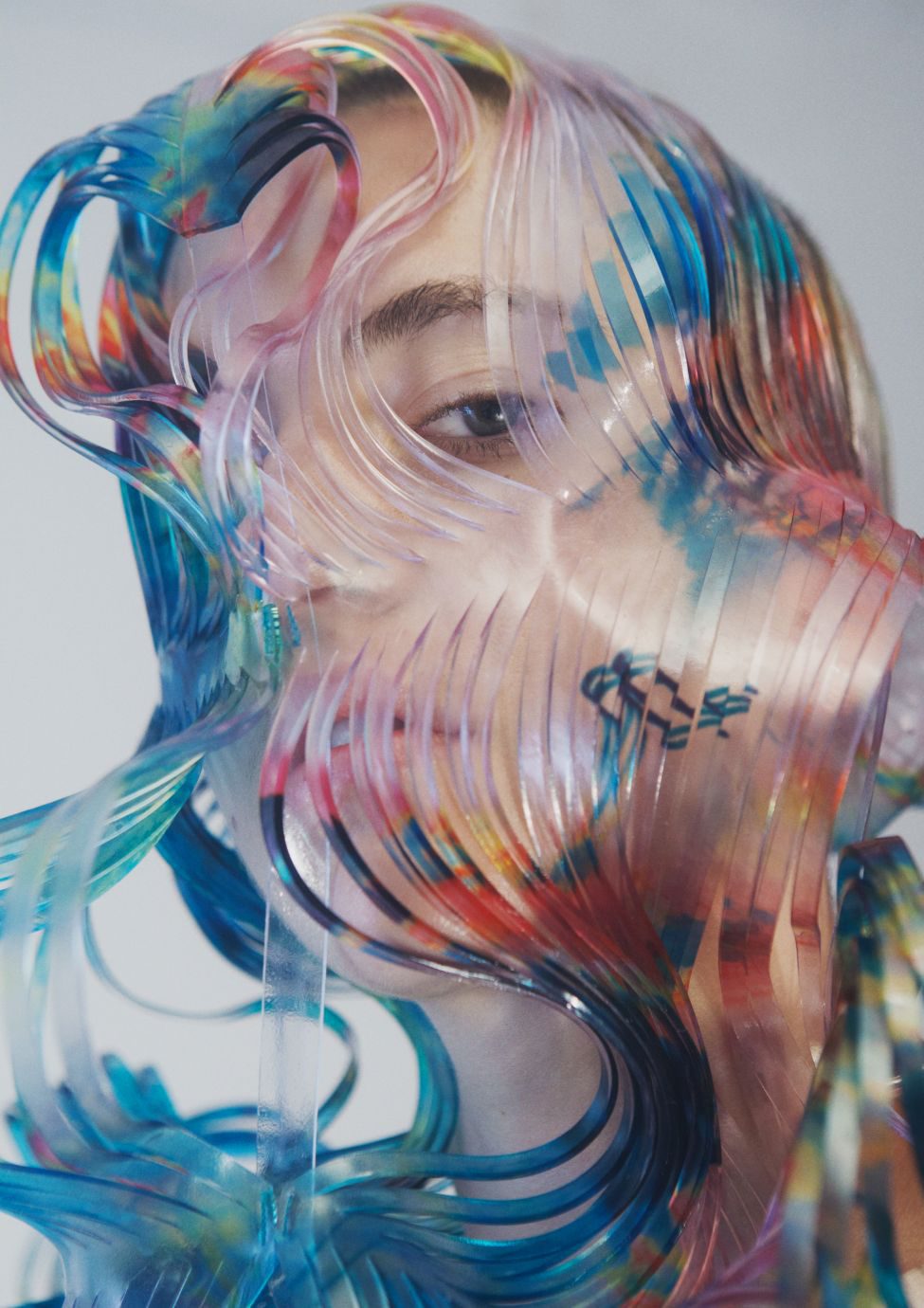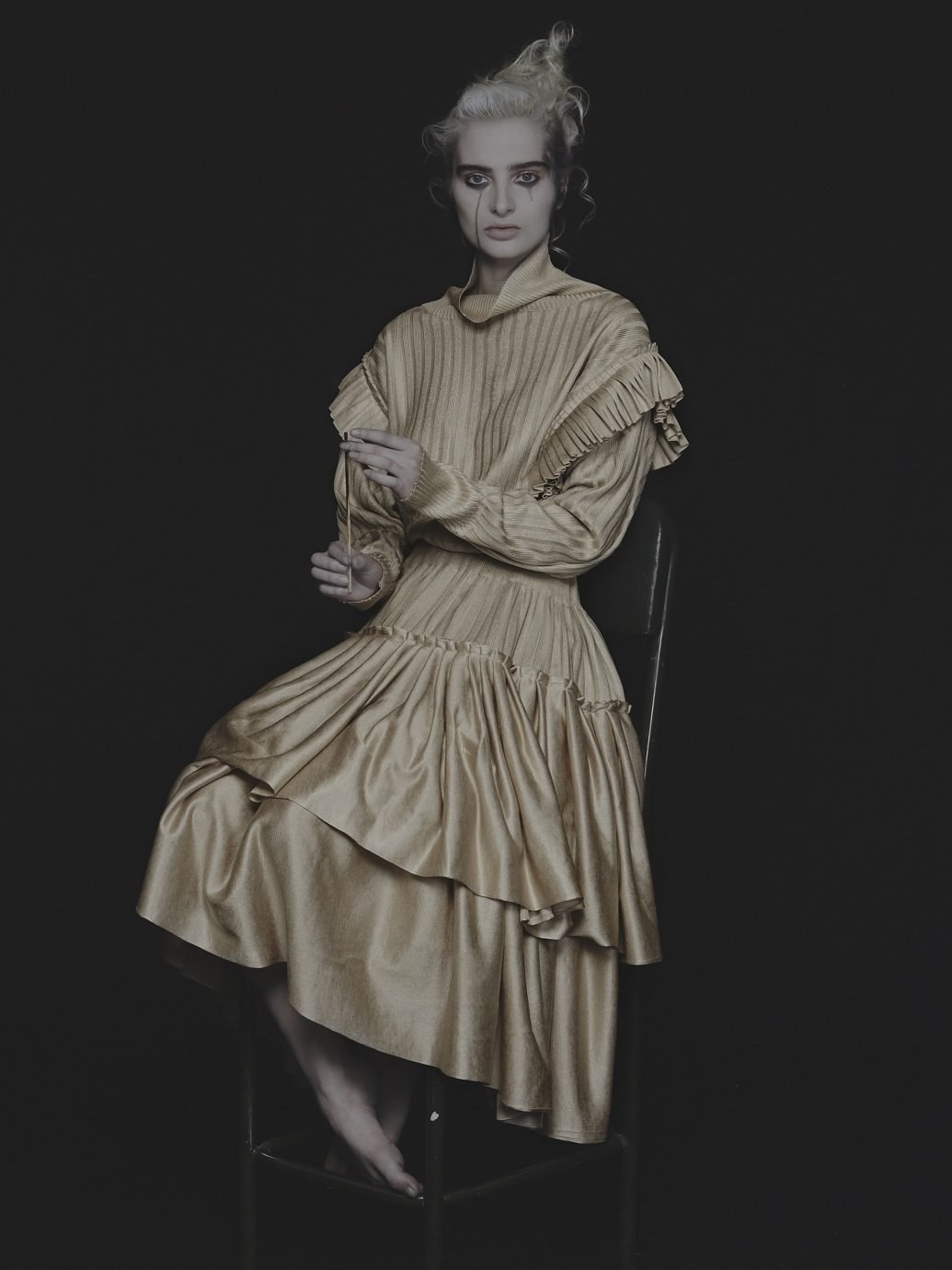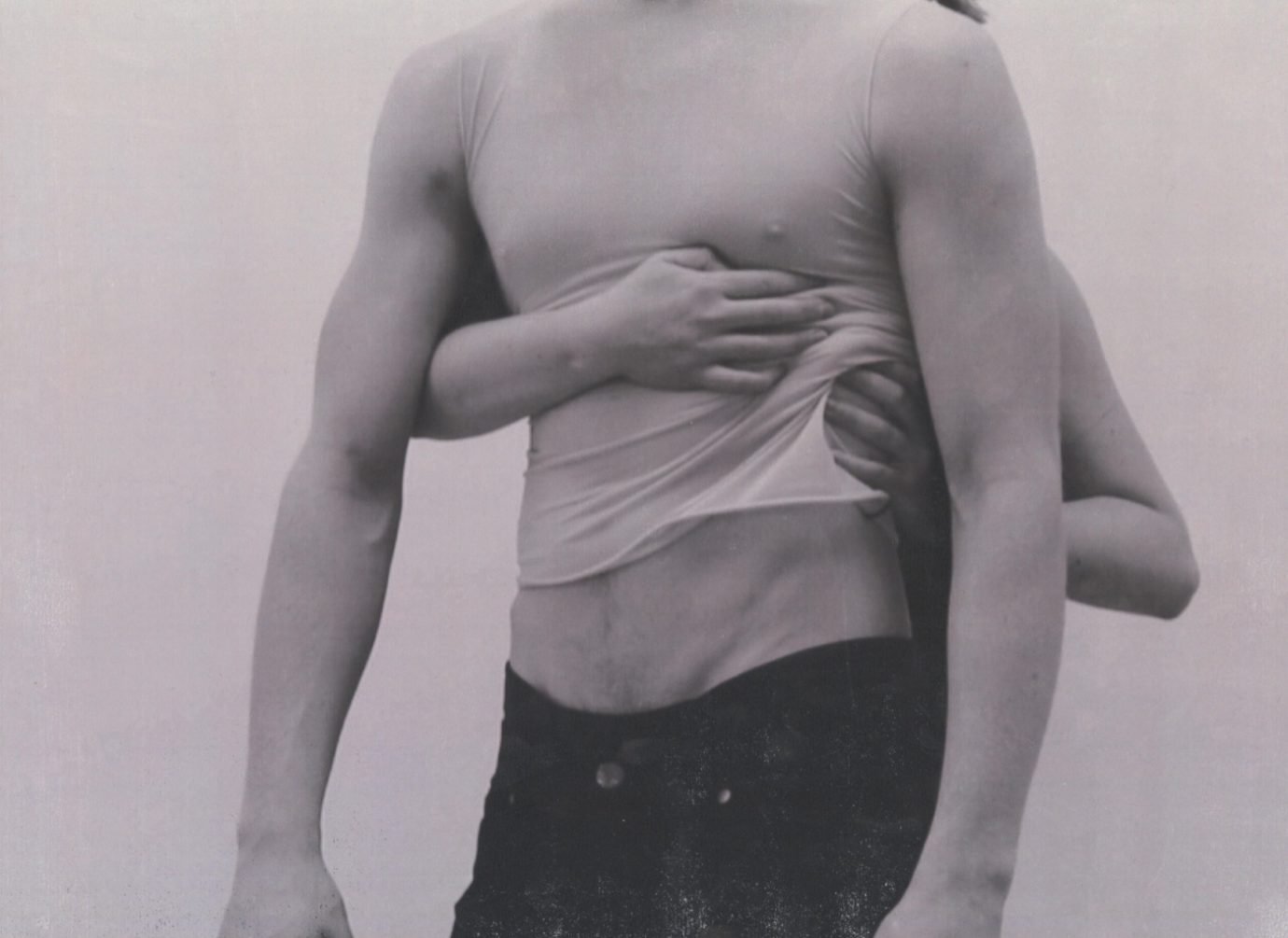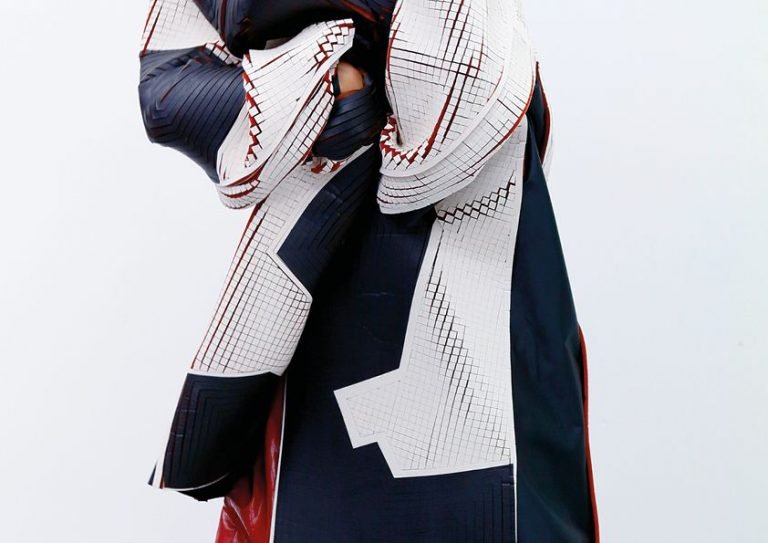“Everything in life is compromise. I think what you fight against is not to compromise.”
What do you think is the most surprising thing that you can learn from a student?
That you can’t offer advice if you aren’t following it yourself. That’s what learning mean, and teaching is a two way relationship. You are reminded that you are older than you think, and with more knowledge. Just because you’ve been around longer, you’ve tasted different honey. It’s easy to be the critic, but you have to critique yourself too. It’s relevant to me in particular, because Boudicca [Zowie’s brand] is not a label that has gone on to have a thousand outlets or to be owned by Gucci.
I’m open to be challenged. Who wants a relationship where you’re doing all the giving? You want someone to challenge you, even if you don’t always like it. It’s better to be competing with someone better, so that it drives you — somebody who mentally and physically sharpens you.
How does Brian, your creative partner, push you in that sense?
Oh, we push each other. We always have done. Love, hate, argument, debate, soulmates, sisters, brothers, lovers, partners. It’s a long journey. It’s precious to have someone in your life that makes you question. Sometimes you hate it, sometimes you love it. Very few people work completely isolated. Yes, you have leaders and CEOs and all of that, but even John [Galliano] had Steven [Robinson] and Bill [Gaytten] as they worked together around his world. Most great people have others who they trust to have conversation and dialogue with. The people part of that exchange in your life are key.
Do you have to compromise with your own brand Boudicca, while being here at RCA?
Everything in life is compromise. I think what you fight against is not to compromise.
You just mentioned not being ‘owned’ by Gucci… What is your opinion about young designers who see this ideal of starting a brand, making rapid growth, and being ‘bought’ by a conglomerate? J.W. Anderson might be a good example.
If you look at the most recent 15-20 years of history, you see that there are waves of conglomerate support. Look for example at the time when they acquired stakes in McQueen and Stella [McCartney], Helmut Lang and Margiela. After that, they pulled right back in again with their backing. It’s fantastic that they’re now supporting newer designers like Nicholas Kirkwood and J.W. Anderson, but I don’t know enough about those companies and how they feel about what that relationship means. There are lots of people who have lost what they were — it’s painful, and it affects your language… We have to recognise that the support is not gonna be there constantly. People might now look up at J.W. Anderson, but that situation might not be there for them. The good thing about fashion is that it never stays the same. That’s why we’re so bizarrely addicted to it.
“How weird: we all want to be the dress designer, when we know it´s the bag designer who makes way more money.”
Compared to when you were studying in the 80´s, what kind of pressure do you think graduating students face now?
The obvious one is money.
Well there never really has been money, right?
There was nothing, but then everyone could just get a space in Old Street. No one paid rates or rent or electricity. We didn’t have a bean, but everything was a lot less expensive. At the same time, there was no support system. There was so little compared to today; people get support with everything now. What you lose here, you gain there: adapt to what it is. What is different? Does it really matter? Yes money is an issue, but there’s a lot more choice now.
In what respect are you still the same designer that you were during your studies?
Why do you have the ambitions that you have?
Who knows. Aren’t you just born with it? You don’t have a choice, I think. Nurture/nature. Do you ever go: ‘why am I who I am?’ Out of the people you meet along the way, you can see who will push and pull you, but you is you. Your core you is much deeper, more beautiful and more complex than a journey that is on the outside. Interestingly, if you think about it that way, maybe that’s the thing that drives you creatively, because you don’t understand why you are who you are.
Do you think we will ever come close to the answer?
I hope not, but I love the idea of understanding more about the brain. Like learning about the frontal cortex where the empathy is built, which explains why as a teenager you’re all complete assholes (because the cortex is not so developed). So young kids who have real issues are often taught to meditate, because in Buddhist mediation they have proven that it increases the empathy position in your brain quicker, sooner and stronger. All of this understanding is really interesting. But the very core of what makes the great people who have come before us ask the questions — which have given us those moments of phenomenal history in paint, art, sound — is about that unknown moment inside of us. I don’t think it’s something algorithmic and scientific: it’s something beyond, and I’m happy that it is.
I’m sorry that we’re stood and that we haven’t sat once. We could go and have a coffee, we could go upstairs, do you want to look upstairs?
***
We walk around the building and arrive in Zowie´s office — the one I´ve come to six months earlier for Wendy Dagworthy´s last interview as the college´s Head of Fashion. It´s quite a change. Instead of a simple clear white desk, there´s a big table in the middle of the room, with stacks of papers on top of it. Papers are also spread on the floor, and they´re hanging on the walls. “My beautiful orchids from Shelley Fox,” Zowie says, pointing at the flowers near the window. They are massive. “Aren’t they gorgeous? They came during the first week I was here, as a welcome from her, and look how well they are still doing!” She then lifts a small glass jar and excitedly says: “This is my favourite Christmas present: an Ai Wei Wei seed.” We get out of the office and walk up a little stairs, then start walking through the accessories department, where she picks up a wooden mold of a shoe and exclaims: “This must be the thinnest Wellie I’ve ever seen! It’s so skinny! It’s like a 2D leg!”
“It’s quite squashy in here, because it’s not just accessories, but there is also footwear and bags. I think some really great work goes on in here. You know how accessories are a very powerful thing for money, and in the industry it’s the thing that we all know moves faster than a dress. I mean how weird: we all want to be the dress designer when we know it’s the bag designer who makes way more money.
Now we make our way through the fashion studios, which are relatively empty, and she starts talking with a student: “Where did you go in the end, fashion or art? Art? Good. The colours are great, whose is this one?”
The student doesn’t know. “You need to know, even if it’s just to share with me. This looks amazing, like candleabra. The 30s movies are a great place for that weird place in between, aren’t they? Like the Folies Bergère. Like a creative Cirque du Soleil. Nice! Good! Well I’m pleased you went there. Good good good good.”
She notices a student on her right, and hugs her: “You had a good break? Feel strong? Clear?”
We walk into the knitwear section: “So this is knit, knit knit knot knit knit, a little bit more knit knit knot knit.”
She winks at students, walks around theatrically moving her arms, joking around.
***
Do you want to experiment as a teacher?
‘Experiment’ is a wrong word, because ‘experiment’ feels like you’re testing something. It’s rather about making sure that we face the future in a powerful new way and ask questions. What is it to be male and female? What is it to be a designer? What does identity mean? What if we live online? Who’s gonna control that? What are we gonna say about that? What are YOU gonna say about that? Are we open to all those opinions? Are we asking the right questions? Do we want to be in the industry that we’re still in? I don’t. I think for me, the strongest thinkers in the industry don’t want to see themselves, they want to see something that also invigorates them. They want to be approached by—-
We’re back in the space where we first started to talk. This time around, she grabs two chairs and slides them my way, next to a table.
— they’re not looking for the same, they’re looking for something different too. Maybe I’m wrong, but we’re in these cities; we’re in these top schools— do you take for granted how incredible that is? That those schools have got such legacy, such history? All those people that have come through, making music, making film, making statement: they have created the world that we know today… This world of ‘what is fashion’. That’s phenomenal. When you think about it, you have an absolute responsibility to not be safe, you have a responsibility to forge forward. But experiment is so not the right word for it. It’s about having that kind of ability to be brave, honest, and truthful.
I spoke with a few people who graduated from RCA´s MA Fashion last year, and at the time they mentioned that you would become the new head of fashion here. They were all so excited, and a little sad that they weren’t taught by you. I quite understand that, because you have this immense energy and a passion for everything, while seeming very supportive and nurturing to students.
“You have an absolute responsibility to not be safe, you have a responsibility to forge forward.”
There’s also that big debate going on about `kicking out´ international students because so many of them are studying here in London. What is your opinion about this?
We live in a global world, I don’t see it being overrun by those students — I see it as very balanced. I don’t think it’s about one over the other. I see some amazing students, and they are across the border. And actually what’s exciting and relevant to our times, is when you’ve got somebody who comes from a country where maybe to be gay isn’t allowed, who meets with a guy from a country where it is allowed but whose best mate just got beat up on a train, having that dialogue and understanding those differences and yet the similarities too, because they spend two years together in a real way. You can learn a lot from that situation. It’s a positive, not a negative. It’s an essential part of our times. You take people on because they’re great, not because of their nationality.
It´s weird to think that the government ´invests´ in the education of people studying here, but then want to push them back to their own countries the second they graduate.
I think it’s wrong. Thousands and thousands of people will come each year, so you’ve got to have some kind of system. You also need to be very human about what the beginning and end of someone’s education is. How do they know they’ve fully learned? It’s not just about making lots of money, in this industry, but the growth of ideas, and that’s got to do with the growth of civilisation and the growth of culture. Why do you wanna close it down? In 2015? Particularly at a time when there is a lot of darkness, and when there are a lot of things globally that challenge us… To me, education seems the wrong area to tighten.


